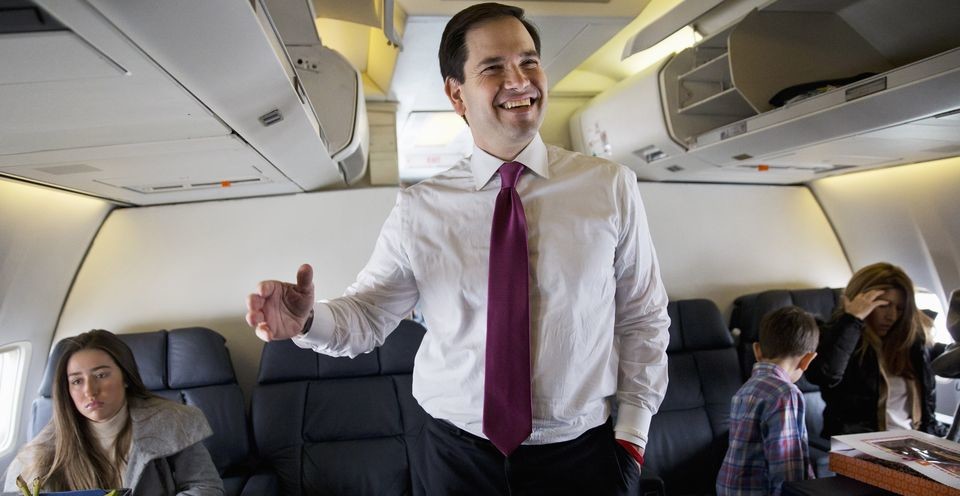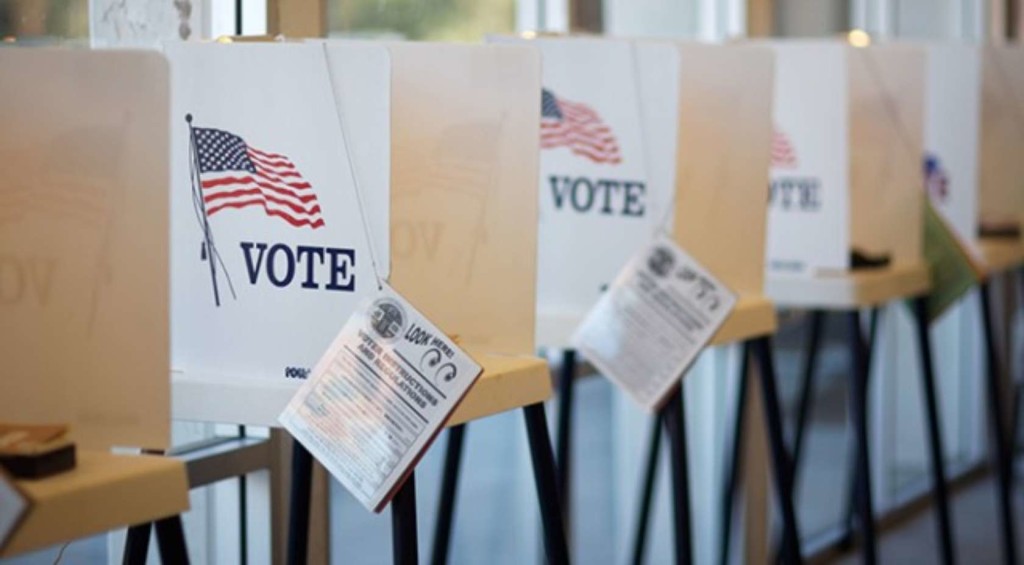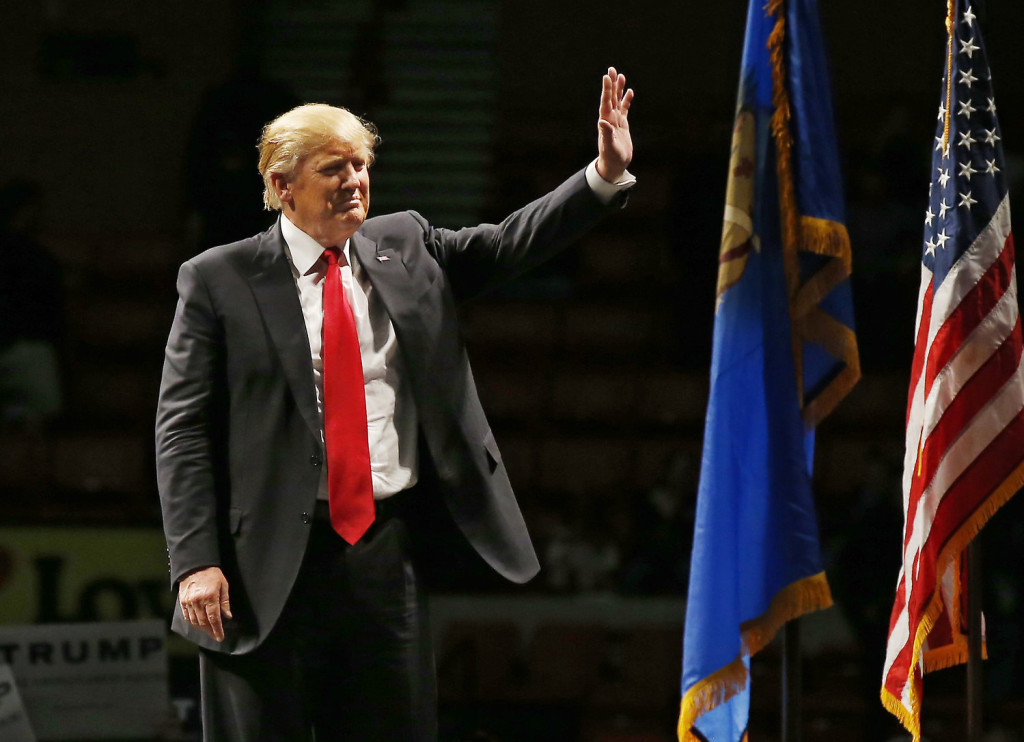Marco Rubio tax returns show steady salary, boosted by book deals

Marco Rubio released summaries of his last five years of tax filings on Saturday, revealing him to be a candidate with a senator’s steady annual income of $176,000 who reaped repeated windfalls from book deals. During his first four years in the Senate, Rubio and his wife Jeanette together earned an average of $531,000 a year. Since winning election to an office in Washington, Rubio’s income has ranged from $276,059 to $938,963, and he has paid between $46,500 and $254,894 in federal income tax. Most of the income came from a business that collected royalties on two books, based on a comparison with personal Senate financial disclosures. In 2012, his most lucrative year, his effective tax rate topped out at a little more than 31 percent. The documents Rubio has released are not complete tax filings, as Mitt Romney provided in 2012 and Hillary Clinton produced last year. Instead, Rubio released the first two pages of his 1040 form, which summarizes the details of his income and taxes. Rubio’s release of his most recent tax returns comes after Republican front-runner Donald Trump said in Thursday’s GOP debate that his tax returns have been the subject of audits for at least a dozen consecutive years. He said he would not release them until that process concludes. “We’re putting these out today to put pressure on Trump and the other candidates to release theirs,” said Rubio campaign spokesman Alex Conant. “To the extent there are additional questions about Marco, we won’t rule out providing more information in the future.” The disclosure makes Rubio the only of the top three Republican candidates to fulfill pledges to disclose their tax information. Despite criticizing Trump during the debate for not disclosing his tax filings, Texas Sen. Ted Cruz did not meet a self-imposed deadline of Friday to release his tax returns for the years since he ran for Senate. Cruz campaign spokeswoman Catherine Frazier on Saturday did not offer a new timeline for releasing the records. “We are pulling them together,” she said. “They will be released. These things take time.” For Rubio, the records add to 10 years of previous tax returns he released when running for the Senate. Those returns show how the young lawmaker’s finances benefited from high-paying jobs at law firms as he rose in state and national politics. In 2000, Rubio and his wife reported a combined income of $82,710. The family’s income grew to more than $330,000 in 2005, the year he became speaker of the House in Florida, and by the time he left the statehouse in 2008, he reported nearly $400,000 in income. Between 2004 and 2008, Rubio gave nearly $50,000 to Christ Fellowship in Miami and more than $16,000 to First Baptist Church of Perrine, Florida, according to the documents released at the time. No such calculation of charitable contributions is possible for the years covered in Saturday’s release, however, because Rubio did not make public the part of his tax returns that itemizes deductions. Republished with permission of the Associated Press.
What to look for in Alabama on Super Tuesday

Alabama voters go to polls Tuesday as part of Super Tuesday contests in 12 states. Hillary Clinton, Ted Cruz, Marco Rubio and Donald Trump all plan stops in Alabama in a last-minute hunt for votes before Tuesday’s election. Republicans and Democrats will also name their picks in congressional and state races. Here’s a look at what to watch for and a look at a few of the key races on Tuesday: • • • CONGRESS On Tuesday, Rep. Martha Roby, R-Montgomery, faces Tea Party challenger Becky Gerritson in the second congressional district that includes Montgomery and the Wiregrass. Roby is perhaps best known for being on the congressional panel investigating Benghazi and has been a vocal critic of delays and problems at Veterans’ Affairs hospitals in the region. Roby said she shares voter frustration with “Washington doublespeak.” “There are so many politicians out there that are so afraid of losing their jobs that they forget to do their jobs. My job is to listen to the people, study the issues, make decisions that are in the best interest of the people I represent and to be honest about it,” Roby said in an interview. Gerritson is the founder of Wetumpka Tea Party, one of the state’s largest and most active tea party organizations. She appeared on the national radar with emotional congressional testimony in 2013 regarding Internal Revenue Service probes of conservative political groups. “We need a true conservative in leadership for District 2,” Gerritson told voters at a campaign stop. “We see year after year, election after election, we are promised that things are going to change and they don’t,” Gerritson said. In South Alabama, Rep. Bradley Byrne is in a rematch with Dean Young, the bombastic real estate developer he bested three years ago for the open congressional seat. Byrne has a heady mix of endorsements ranging from the NRA, the U.S. Chamber of Commerce and Sen. Jeff Sessions. Young is running an ad of clipped-together news segments from their last race. News commentators refer to Byrne as the “establishment” candidate eight times in the 30-second spot. While any anti-establishment surge could hurt incumbents, challengers from the party’s far right, like Young and Gerritson, struggle under a compressed campaign season while facing opponents with superior name recognition and financial firepower. Five-term Sen. Richard Shelby is running an aggressive campaign, unloading a portion of a $19 million war chest, as he looks to a sixth term in office in the midst of the insurgent voter mood. Shelby faces off with four lesser known challengers in the GOP primary, most notably Jonathan McConnell, a former Marine who now runs a ship security business putting former Marines on vessels. • • • PUBLIC SERVICE COMMISSION PRESIDENT One of the few statewide races on the ballot is the Republican primary for president of the Public Service Commission. The race pits incumbent Twinkle Andress Cavanaugh against former PSC member Terry Dunn. • • • BRING PHOTO ID This will be the first presidential race under Alabama’s new photo identification requirement for voting. Alabama requires voters to show photo identification at the polls such as a driver’s license, passport, an Alabama non-driver ID, a university student ID or identification issued by the federal government. A person without photo ID can submit a provisional ballot, but it won’t be counted unless they bring in the required identification. • • • TURN THE BALLOT OVER Voters should remember to look on the back of the ballot. The presidential candidates and numerous delegates to party nominating conventions appear on the front of the ballot, while state and local offices are on the back. Republished with permission of the Associated Press.
Donald Trump wants to weaken libel laws amid feuds with reporters

Donald Trump is threatening to weaken First Amendment protections for reporters as president, making it easier for him to sue them. The celebrity businessman turned Republican presidential front-runner told a rally in Forth Worth, Texas, Friday that he wants to “open up” libel laws. The changes envisioned by Trump would mean that “when they write purposely negative and horrible and false articles, we can sue them and win lots of money,” he said. Trump added that, should he be elected, news organizations that have criticized him will “have problems.” He specifically mentioned The New York Times and The Washington Post. Trump last month threatened to sue the Post after the newspaper wrote an article about the bankruptcy of his Atlantic City casino. On Twitter, Trump has routinely criticized reporters who cover him and their news organizations, including The Associated Press. First Amendment advocates condemned Trump’s suggestions. “His statement shows why we need libel protections,” said Gregg Leslie, legal defense director for the Washington-based Reporters Committee for Freedom of the Press. “Trump gets offended, he gets upset and he wants to sue to retaliate. That’s not a good reason to sue someone.” Libel law in the United States generally makes it difficult for public figures to sue reporters or other people who criticize them. To win such a case, the plaintiff must demonstrate that factually incorrect statements were made with actual malice or a reckless disregard for the truth. Trump said he would like to lower that standard. “We’re going to have people sue you like you never got sued before,” he said. Because the Supreme Court has repeatedly endorsed the existing legal standard, Trump could not change libel laws as they affect public figures by executive order or even with an act of Congress, Leslie said. “I’ve never heard of politicians say they would repeal case law established under the First Amendment,” he said. “You’d really need a constitutional amendment to do that.” Trump’s comments on libel law are not the first time he has disagreed with widely held conceptions of constitutional law. Last year, he said he saw no obstacle to deporting children born to undocumented immigrants in the United States. Courts have regularly found that such children are natural born citizens entitled to the same rights as any other American. Trump has said he does not believe a constitutional amendment would be necessary to get his way. “You don’t have to do a constitutional amendment. You need an act of Congress. I’m telling you — you need an act of Congress,” he said in an interview with Bill O’Reilly of Fox News last year. Republished with permission of the Associated Press.


